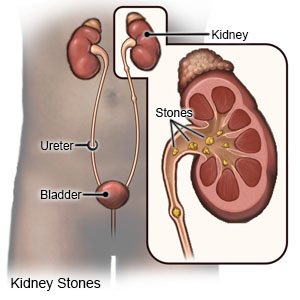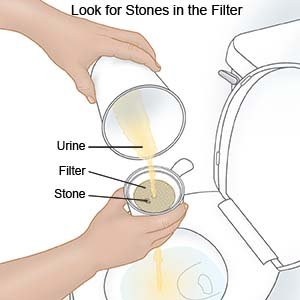Kidney Stones in Children
Medically reviewed by Drugs.com. Last updated on May 6, 2024.
What is a kidney stone?
Kidney stones form in the urinary system when the water and waste in your child's urine are out of balance. When this happens, certain types of waste crystals separate from the urine. The crystals build up and form kidney stones. Kidney stones can be made of uric acid, calcium, phosphate, or oxalate crystals. Your child may have more than one kidney stone.
 |
What increases my child's risk for kidney stones?
- Not drinking enough liquids (especially water) each day
- Having urinary tract infections often
- Too much of certain foods, such as meat, salt, nuts, and chocolate
- Obesity
- Certain medicines, such as diuretics, steroids, and antacids
- A family history of kidney stones
- Being born with a kidney or bowel disorder
What are the signs and symptoms of kidney stones?
- Pain in the middle of your child's back that moves across to his or her side or that may spread to the groin
- Nausea and vomiting
- Urge to urinate often, burning feeling when your child urinates, or pink or red urine
- Tenderness in the lower back, side, or stomach
How are kidney stones diagnosed?
Your child's healthcare provider will ask about your child's health and usual foods. He or she may refer your child to a urologist. Your child may need tests to find out what type of kidney stones he or she has. Tests can show the size of the kidney stones and where they are in your child's urinary system. Your child may have any of the following:
- Urine tests may show if your child has blood in his or her urine. They may also show high amounts of the substances that form kidney stones, such as uric acid.
- Blood tests show how well your child's kidneys are working. They may also be used to check the levels of calcium or uric acid in your child's blood.
- X-ray or ultrasound pictures may be taken of your child's kidneys, bladder, and ureters. Your child may be given contrast liquid before an x-ray to help these show up better in the pictures. Your child may need to have more than one x-ray. Tell the healthcare provider if your child has ever had an allergic reaction to contrast liquid.
How are kidney stones treated?
- NSAIDs , such as ibuprofen, help decrease swelling, pain, and fever. This medicine is available with or without a doctor's order. NSAIDs can cause stomach bleeding or kidney problems in certain people. If your child takes blood thinner medicine, always ask if NSAIDs are safe for him or her. Always read the medicine label and follow directions. Do not give these medicines to children younger than 6 months without direction from a healthcare provider.
- Prescription pain medicine may be given. Ask your child's healthcare provider how to give this medicine safely. Some prescription pain medicines contain acetaminophen. Do not give your child other medicines that contain acetaminophen without talking to your healthcare provider. Too much acetaminophen may cause liver damage. Prescription pain medicine may cause constipation. Ask your child's healthcare provider how to prevent or treat constipation.
- Medicines to balance your child's electrolytes may be needed.
- A procedure or surgery to remove the kidney stones may be needed if they do not pass on their own. Your child's treatment will depend on the size and location of the stones, and your child's age.
Treatment options
The following list of medications are related to or used in the treatment of this condition.
What can I do to manage my child's kidney stones?
- Offer your child more liquids. Your child's healthcare provider may tell you to have your child drink at least 8 to 12 (eight-ounce) cups of liquids each day. This helps flush out the kidney stones when your child urinates. Water is the best liquid to drink.
- Strain your child's urine every time he or she goes to the bathroom. Have your child urinate through a strainer or a piece of thin cloth to catch the stones. Take the stones to your child's healthcare provider so they can be sent to a lab for tests. This will help your healthcare providers plan the best treatment for your child.

- Ask if your child should avoid any foods. He or she may need to limit oxalate. Oxalate is a chemical found in some plant foods. The most common type of kidney stone is made up of crystals that contain calcium and oxalate. Your child's healthcare provider or dietitian may recommend limiting oxalate if your child gets this type of kidney stone often. You may need to limit how much sodium (salt) or protein your child eats. Ask for information about the best foods for your child.

- Encourage your child to exercise regularly. The stones may pass more easily if your child stays active. Exercise can also help your child manage his or her weight. Ask about the best activities for your child.

When should I seek immediate care?
- Your child cannot stop vomiting.
When should I call my child's doctor or kidney specialist?
- Your child has a fever.
- Your child has trouble urinating.
- You see blood in your child's urine.
- Your child has severe pain.
- You have any questions or concerns about your child's condition or care.
Care Agreement
You have the right to help plan your child's care. Learn about your child's health condition and how it may be treated. Discuss treatment options with your child's healthcare providers to decide what care you want for your child. The above information is an educational aid only. It is not intended as medical advice for individual conditions or treatments. Talk to your doctor, nurse or pharmacist before following any medical regimen to see if it is safe and effective for you.© Copyright Merative 2024 Information is for End User's use only and may not be sold, redistributed or otherwise used for commercial purposes.
Learn more about Kidney Stones
Treatment options
Symptoms and treatments
Medicine.com guides (external)
Further information
Always consult your healthcare provider to ensure the information displayed on this page applies to your personal circumstances.
